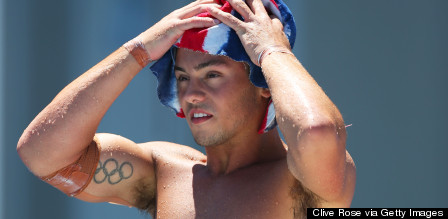
Recently, England's 19-year-old diving sensation, and 2012 Olympic bronze medalist, Tom Daley, released an emotional YouTube video in which he revealed his relationship with a man. This revelation puts Daley among only a handful of athletes who have disclosed their sexuality, while still active in their sports. Aside from notable exceptions, such as Martina Navratilova, who came out while at the top of her tennis career in 1981, coming out as an active gay athlete is a relatively new phenomena. Earlier this year, Jason Collins, who played with the Boston Celtics and the Washington Wizards during the NBA's 2012-2013 season, made history when he became the first male professional athlete, currently playing in the United States to announce he's gay. And although Collins is not the only out active athlete -- professional featherweight boxer Orlando Cruz also came out in 2012 -- a more common pattern is disclosure of sexuality post-retirement. From the NFL, Esera Tuaolo, Kwame Harris, Wade Davis, David Kopay and Roy Simmons all came out post-retirement, as did John Amaechi (NBA), Greg Louganis (diving) and Billie Bean and Glenn Burke (MLB).
Don't get me wrong, I recognize and admire the courage it took for these athletes to come out in their retirement. Their actions helped to shift perceptions, decimating the notion that gay men or women cannot perform as successful athletes. But active out gay athletes have the potential to act as important role models for young people. For gay youth, the visibility of a high achieving gay athlete sends the message that their sexuality should not be a barrier to sporting success. For all youth, seeing teams of gay and straight athletes working together towards a common goal breaks down notions of differences across sexual orientations.
The need for positive roles models for gay youth is illustrated by the It Gets Better Project, created by writer Dan Savage in 2010. Savage developed the project in response to the high rates of suicide among gay youth; gays are significantly more likely to attempt suicide compared with heterosexual youth (21.5 percent versus 4.2 percent), and among gay youth, the risk of attempting suicide is 20 percent greater in environments characterized by homophobia or lack of positive support services. As gay youth progress to adulthood, these stresses may continue to manifest themselves in poor health outcomes. My own recent research, published in the American Journal of Men's Health, drew on a sample of 1,000 gay men from Atlanta, and showed that gay men who reported that they heard statements such as "being gay is not normal" in their youth were more likely as adults to engage in sexual risk-taking. Similarly, Diana Burgess and colleagues at the University of Minnesota noted that compared with heterosexuals, gay adults are 68 percent more likely to experience depression, and 56 percent more likely to experience anxiety. Ilan Meyer, a senior scholar at UCLA's School of Law, offers an explanation for these disparities through his "Theory of Minority Stress," suggesting that these health inequities are rooted in discrimination, with negative behaviors acting as coping mechanisms for repeated exposure to stigma-related stress.
Growing up without visible gay role models sends a clear message to gay youth that they are different. A lack of high profile gay athletes sends the message that they don't belong in mainstream sports. These social scripts act to perpetuate a division of gay and straight; all youth, regardless of sexual orientation, are sent a clear message that gay people either don't belong in sport, or must hide their orientation until their career is over. As my own research shows, these messages have lasting impacts -- sometimes fatal -- on health behaviors as adults.
But the courageous actions of Daley, Collins and others have the potential to change this. Many out gay men I know questioned whether Tom Daley's revelation warranted news coverage. If the revelation had come from a pop star or television personality, I would have perhaps agreed: We no longer have national freak-outs of the type that surround Ellen DeGeneres' coming out. But there are areas of public life -- sports, country music -- in which a disclosure of sexuality still causes ripples. And these ripples are good. They create public discourse, teach our youth the importance of identity, illustrate that sexual orientation does not link to sporting prowess and, above all, creates possibilities for other gay athletes to reveal their sexuality.
As we approach the Winter Olympics in Sochi, which have been shrouded in controversy around Russia's homophobic laws, the need for out gay athletes becomes even more important. Gay men and women succeeding in sport goes a long way to creating acceptance of sexual minorities. But gay men and women winning medals on the home ground of an oppressive regime -- that teaches our youth the importance of pride, identity and could create a new American hero for all children to look up to.